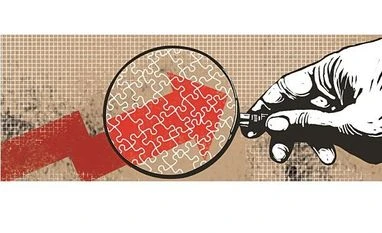Maruti Suzuki India Chairman R C Bhargava recently noted that India needed a political consensus on how to grow the economy. Mr Bhargava was spot on. India lacks a political consensus on the way the economy, including the role of the private sector, should be managed. This makes decision-making more difficult for the government of the day. Even in the present context, a fair and free-flowing discussion among all stakeholders will help generate ideas to revive the flagging economy. Growth in the Indian economy slipped to a six-year low of 4.5 per cent in the second quarter of the current fiscal year. A perception of fear and a lack of clarity on economic policy will certainly affect India’s potential. Even though individual observations can be debated, the fact that industry leaders are voicing their concerns and the government is willing to listen are welcome signs.
At a broader level, call it the long shadow of the licence-quota raj, governments in India are generally sensitive to being seen doing things for the private sector. It is puzzling that, despite benefiting significantly from economic reforms over the decades, both the government and public, in general, are not prepared to give the private sector a bigger role. This distrust is reflected in the maze of prevalent rule and regulations, which stifles entrepreneurship and gives the state enormous power that is often used to create fear. The Economic Survey (2016-17) fittingly captured India’s ambivalence about the private sector and highlighted: “… India has distinctly anti-market beliefs relative to others, even compared to peers with similarly low initial GDP [gross domestic product] per capita levels.” This needs to change if India has to grow at higher rates and create gainful employment for its rising workforce.
While the Central government has taken several steps to improve the ease of doing business, which is also reflected in India’s World Bank’s rankings, it should now open up the debate and build a larger consensus on deeper reforms. Firms should be able to operate freely and the administration, including state governments, must intervene only in the case of a market failure. On the other hand, the private sector needs to improve governance standards. On balance, however, the private sector has done well over the years, and its role needs to be expanded with an enabling regulatory environment which allows entrepreneurs to take risks. For better policy formation, stakeholders should be able to express their views freely and the government must take decisions after considering different viewpoints. Benefits of such a process are not limited to economic policy alone.
To read the full story, Subscribe Now at just Rs 249 a month
Already a subscriber? Log in
Subscribe To BS Premium
₹249
Renews automatically
₹1699₹1999
Opt for auto renewal and save Rs. 300 Renews automatically
₹1999
What you get on BS Premium?
-
Unlock 30+ premium stories daily hand-picked by our editors, across devices on browser and app.
-
Pick your 5 favourite companies, get a daily email with all news updates on them.
Full access to our intuitive epaper - clip, save, share articles from any device; newspaper archives from 2006.
Preferential invites to Business Standard events.
Curated newsletters on markets, personal finance, policy & politics, start-ups, technology, and more.
Need More Information - write to us at assist@bsmail.in
)